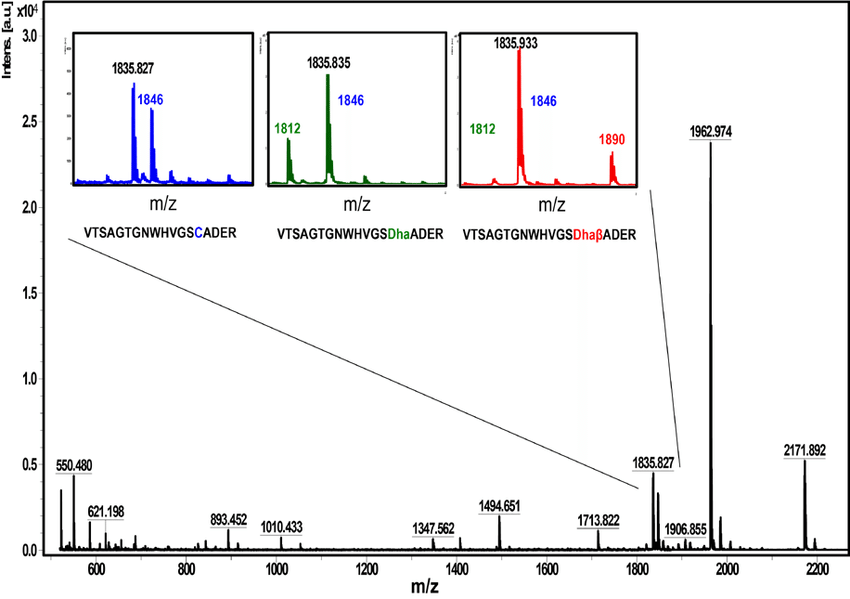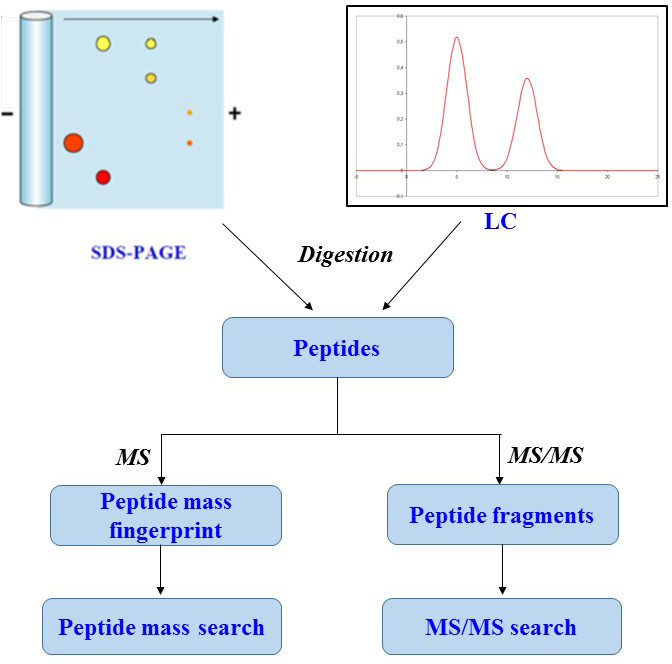Peptide Mass Fingerprint Service
Peptide mass fingerprint (PMF) service is a protein identification method based on mass spectrometry, where the molecular weights of peptide fragments generated by protease digestion are measured and matched against a database to achieve efficient identification of target proteins. This technique eliminates the need for complex protein sequencing and enables fast and accurate identification by comparing peptide mass information with databases. With high throughput, simplicity, and reliability, PMF is widely used in protein functional research, disease mechanism studies, and drug development.

Bertoldo, J. B. et al. Chem. 2017.
Figure1. Peptide Mass Fingerprint (PMF) of Wild-type PtpA
Service at MtoZ Biolabs
MtoZ Biolabs provides professional peptide mass fingerprint service using state-of-the-art platforms such as MALDI-TOF MS and LC-ESI-MS, including Thermo Fisher Orbitrap systems. Our service is designed to address challenges in protein identification, enabling precise analysis of complex biological samples, including cell lysates, tissues, and purified proteins. With PMF, researchers can quickly identify target proteins, explore protein functions, and uncover mechanisms behind diseases or drug interactions, offering reliable solutions for both fundamental research and industrial applications. MtoZ Biolabs ensures high-quality results, supported by advanced technology and expert guidance.
Analysis Workflow
The core of peptide mass fingerprint service lies in using mass spectrometry to measure the precise molecular weights of peptides produced by enzymatic digestion and identifying proteins by matching unique mass fingerprints with known databases. Commonly used instruments include Matrix-Assisted Laser Desorption/Ionization-Time of Flight Mass Spectrometry (MALDI-TOF MS) and Electrospray Ionization Mass Spectrometry (ESI-MS). The workflow involves the following steps:
1. Sample Preparation:
Proteins are extracted and purified to ensure sample integrity and purity, followed by enzymatic digestion (e.g., with trypsin) to produce peptide fragments.
2. Peptide Mass Measurement:
The molecular weights of the peptide fragments are measured using MALDI-TOF MS or ESI-MS, generating a characteristic mass fingerprint.
3. Data Analysis:
The obtained mass fingerprint is compared with databases (e.g., UniProt or NCBI) to identify target proteins based on peptide mass and fingerprint features.
4. Report Generation:
Detailed protein identification reports are provided, including matched peptides, protein scores, and functional annotations.
MtoZ Biolabs utilizes state-of-the-art MALDI-TOF and LC-ESI-MS systems to ensure the accuracy and high resolution of data in peptide mass fingerprint service.

Figure2. A Typical Workflow of a Peptide Mass Fingerprinting Experiment
Technical Advantages
PMF is renowned for its precision, efficiency, and flexibility, and its successful implementation addresses key technical challenges:
✅ Wide Sample Compatibility
Capable of handling complex biological samples, such as cell lysates and tissue extracts, ensuring broad applicability.
✅ High-Resolution Mass Spectrometry
MtoZ Biolabs employs advanced instruments such as Thermo Fisher Orbitrap and Bruker MALDI-TOF systems to guarantee high accuracy of peptide mass data.
✅ Efficient Database Matching
Optimized algorithms enable rapid database searches, significantly reducing identification time.
✅ Expert Support
Our experienced team is proficient in proteomics and mass spectrometry, providing comprehensive technical guidance and data interpretation.
With these advantages, MtoZ Biolabs’ peptide mass fingerprint service offers robust support for various protein research scenarios.
Application
Peptide mass fingerprint service has a wide range of applications, including:
1. Protein Functional Studies: Identifying unknown proteins to explore their biological functions and mechanisms.
2. Disease Mechanism Research: Identifying key proteins in studies of cancer, neurodegenerative diseases, and other conditions, supporting the discovery of potential biomarkers.
3. Drug Target Screening: Rapid identification of drug-target interactions, providing foundational data for drug development.
4. Protein Complex Studies: Identifying components within protein complexes to understand protein-protein interactions.
5. Industrial Applications: Protein identification in enzyme engineering and biocatalysis to optimize industrial processes.
MtoZ Biolabs’ peptide mass fingerprint service delivers efficient and accurate analysis to support research and industrial applications, making it an essential tool for unlocking the mysteries of proteins. For more information or to customize a service, feel free to contact us.
How to order?







